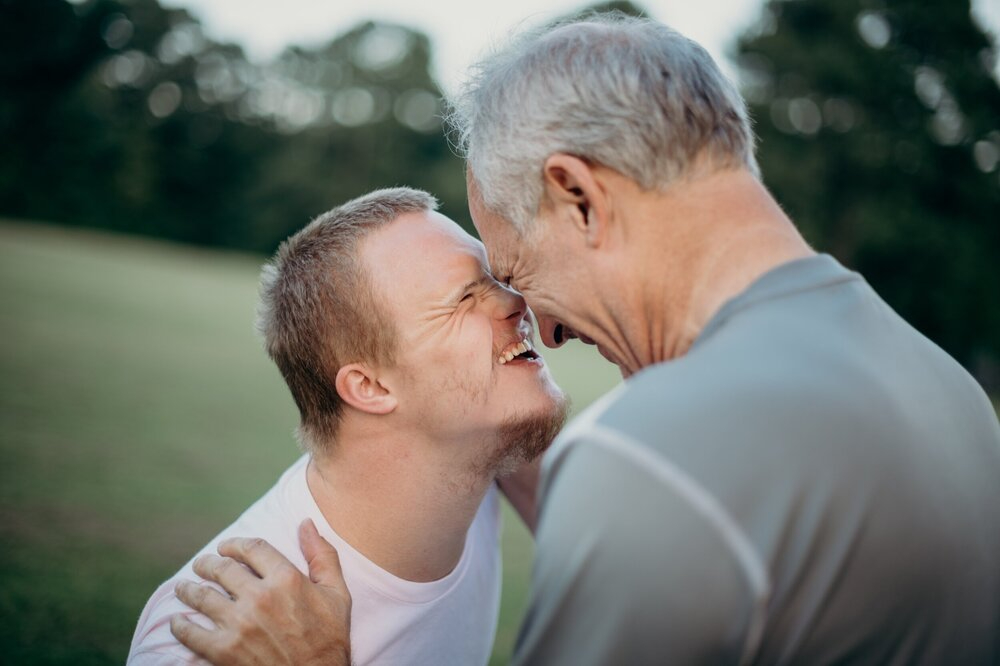Having good mental health is essential for us to all live happy and healthy lives, but around one in four of us will experience a mental health problem. When you’re experiencing a mental health problem supportive, trustworthy, reliable information can make all the difference. Knowing you are not alone in your feelings and can get advice and support can help you to cope better and manage your mental health.
The extent to which anyone will need support will vary. Often advice on how you can help yourself will be enough, but sometimes you might find it easier to talk to someone who can help you and provide you with the support you need.
In this section of our website, we highlight a range of advice and information that you might find useful, useful tools that might help you manage your own mental health, information on the type of organisations you can call or arrange to meet with and what to do if you find you are in need of urgent help. Click on the boxes below, or the menu at the top of this page, to take you to the relevant section for more details.
 There is a lot of advice and information available and sometimes the search for what you need can feel overwhelming. In this section, we have tried to identify some of the resources that we think you will find useful. It’s not an exhaustive list, but it should help you find useful sources of information and advice quickly and easily.
There is a lot of advice and information available and sometimes the search for what you need can feel overwhelming. In this section, we have tried to identify some of the resources that we think you will find useful. It’s not an exhaustive list, but it should help you find useful sources of information and advice quickly and easily.
A good place to start is the NHS website Every Mind Matters which has helpful guides to understanding mental health, information and advice. There is also an NHS website with information about mental health services and how to access them.
The organisation MIND also offers a wide range of information and support and a helpful A-Z of mental health on its website.
The Isle of Wight Community Mental Health Wellbeing Service managed by Isorropia, also has a range of resources, videos and advice on their website created by their team of professionals and those with lived-experience of mental health problems. They also have a dedicated Facebook page with helpful tips and information.
You can also talk to your GP about your mental health concerns and they can refer you to other support services that can help you including the Improving Access to Psychological Therapies Service (IAPT). The IsleTalk IAPT service is located in GP surgeries and other community venues across the Island and provides support for people suffering from common mental health problems such as anxiety, depression, stress, and low self-esteem. The IsleTalk IAPT service also has an employment service that works alongside the therapists to support people with mental ill health or disability by helping them return to work, retain their current employment, find new employment, volunteering opportunities or undertake training/education. Find out more.
 On the Isle of Wight there are a number of organisations that can provide you with support, if you feel the things you have been doing to try and help yourself are not making you feel any better.
On the Isle of Wight there are a number of organisations that can provide you with support, if you feel the things you have been doing to try and help yourself are not making you feel any better.
Isle of Wight Community Mental Health Wellbeing Service
The Isle of Wight Community Mental Health Wellbeing Service also runs a website and a dedicated Facebook page with helpful tips and information.
IsleTalk Improving Access to Psychological Therapies Service (IAPTS)
The IsleTalk IAPT service is located in GP surgeries and other community venues across the Island and provides support for people suffering from common mental health problems such as anxiety, depression, stress, and low self-esteem. They provide services such as Group sessions, Cognitive Behavioural Therapy and signposting. The team also has an employment service that works alongside the therapists (see Working Towards Wellbeing below).
Single Point of Access Team (SPA)
Access to all mental health services on the Isle of Wight is provided by the Single Point of Access Service (SPA). The SPA team conduct all crisis/ Urgent and Non Urgent assessments on the Isle of Wight. Their primary purpose is mental health clinical triage and face to face comprehensive assessments of mental health presentations. SPA conduct structured risk assessments, comprehensive biopsychosocial assessments and identify treatment pathways for service users who will require specialist secondary care. The service also signposts to alternative help and provision if this is thought more appropriate to a person’s needs. They provide crisis support 7 days a week between 7am - 9.30pm on 01983 522214. Alternatively 111 offer 24/7 access to a mental health practitioner.
Community Mental Health Services (Three Locality Teams)
These three teams provide assessments and treatments in the local communities for people aged 18 and over, who have mental health problems, including people who have complex needs. They provide a single point of entry to mental health services, and carry out screening and assessments, signposting, referrals for social care assessments, outpatient clinics, and home visits if necessary. Find out more about the services here.
Community Mental Health Safe Haven
If you are aged 18 or over, you can contact or drop-in to the Community Mental Health Safe Haven where trained professionals can discuss your mental health concerns and provide you with some help. Telephone: 01983 520168 or by email: safehaven@twosaints.org.uk This service operates Monday to Friday between 5pm - 10pm and 10am - 10pm (weekends and bank holidays).
Peer Support
Peer support is when people use their own experiences to help each other. Forms of peer support include community groups, mentoring, self-help groups, online communities and support groups and it can improve emotional health, wellbeing and sense of belonging.
The Just Be support group is aimed primarily at people with mental health issues and is based at Aspire Ryde, Trinity Buildings, Dover Street. Ryde. PO33 2BN. Tel: 01983 716020 for more details.
Employment support
The Working towards Wellbeing service are an experienced team of employment advisors from a varied range of backgrounds who support people with mental ill health or disability by helping them return to work, retain their current employment, find new employment, volunteering opportunities or undertake training/education. Working as part of the employment division of charity Osel Enterprises, they work within the Community Mental Health Team and IsleTalk IAPT. You can contact the service here.
Support from your local health centre
You can also get support from social prescribers, health and wellbeing coaches and mental health practitioners who work in your local GP practice.
Social prescribers can help work with you and your family to help you access a range of local community services that provide practical or emotional support and guidance of a non-medical nature. You can download a leaflet about social prescribing.
Health and wellbeing coaches are specially trained non-clinical members of a GP practice team who help people to manage their own physical and mental health conditions. You can download a leaflet about health and wellbeing coaches.
Mental health practitioners can provide guidance, advice, signposting and treatment for patients with mental health symptoms such as low mood, anxiety or depression.
If you’re concerned about your mental health or about a loved one, then there are a range of different organisations that you can talk to for more help and support.
The NHS have a list of different helplines that you might find useful, depending on your circumstances, see also the list on the right hand side of this page.
General mental health concerns
Two key helplines which you can call in the first instance are:
-
Saneline Tel: 0300 304 7000 (365 days a year, 4.30pm - 10.30pm) - emotional support for people affected by mental health illness, their families or carers
-
Mind Tel: 0300 123 3393 (Mon - Fri, 9am - 6pm) - providing advice and support to anyone experiencing a mental health problem
You can also contact the IW Mental Health Safe Haven based in Newport and Aspire in Ryde on 01983 520168 where trained professionals can discuss your mental health concerns and provide you with some help. This service operates Monday to Friday between 5pm - 10pm and 10am - 10pm (weekends and bank holidays). You can also email: safehaven@twosaints.org.uk if you prefer.
If you are struggling and need support you can also call the Samaritans free anytime from any phone on 116 123.
Don’t forget you can also call NHS 111 (simply dial 111) or use the online service on their website here.
In your local area you can also get support from social prescribers, health and wellbeing coaches and mental health practitioners who work in your local GP practice.
Social prescribers can help work with you and your family to help you access a range of local community services that provide practical or emotional support and guidance of a non-medical nature. You can download a leaflet about social prescribing.
Health and wellbeing coaches are specially trained non-clinical members of a GP practice team who help people to manage their own physical and mental health conditions. You can download a leaflet about health and wellbeing coaches.
Mental health practitioners can provide guidance, advice, signposting and treatment for patients with mental health symptoms such as low mood, anxiety or depression.
Mental health support during pregnancy
If you are pregnant and need support, local midwives and health visitors offer support with perinatal mental health and can be contacted for support on the following numbers:
-
Community midwife locality leads: Tel: 01983 822099 ext 3210 (8am-8pm Monday-Friday)
-
Safeguarding midwife: Tel: 01983 822099 ext. 3263 (9am-5pm Monday-Friday)
Domestic abuse/mental health support
Domestic abuse can have an effect on both adults’ and children’s mental health and well-being. It is important to remember there is local support available to help, guide and support you through this. Contact You Trust (Isle of Wight) on 0800 234 6266. You can also find information on their website here.
Bereavement support for anyone affected by suicide Amparo - Free and confidential support for people of all ages for as long as you need it. Support can be provided one-to-one, to family groups, groups of colleagues or peers – whatever is preferred by you and is most appropriate to your situation. The service can be delivered in your home or wherever you are most comfortable. Call 0330 088 9255. Please note this is not a crisis line.
 If you have learning disabilities and/or autism or are caring for someone with learning disabilities and/or autism you will know that problems experienced vary on an individual basis and require different levels of support. The same is true of mental health problems and, like anyone, this can occur at any stage of life. People with a learning disability and/or autism can be more likely to experience poor mental health and being able to find the right support, at the right time, in the right place can make a big difference to being able to lead a happy and fulfilled life.
If you have learning disabilities and/or autism or are caring for someone with learning disabilities and/or autism you will know that problems experienced vary on an individual basis and require different levels of support. The same is true of mental health problems and, like anyone, this can occur at any stage of life. People with a learning disability and/or autism can be more likely to experience poor mental health and being able to find the right support, at the right time, in the right place can make a big difference to being able to lead a happy and fulfilled life.
Details of some of the organisations that you may find useful for advice and support are detailed below.
General advice
Mencap, the national charity, provides advice and support through its online resources and through its Learning Disability Helpline which operates between 9am to 3pm, Monday to Friday on tel: 0808 808 1111. The charity MIND also has details of other organisations which can help provide support, click here for more details.
Local services
Locally, the Isle of Wight Community Learning Disability Team provides health support to adults living on the Isle of Wight. They also have easy read resources about their service on their website which you may find useful. You can find out more here about what they do and the eligibility criteria for the service. The Team also provides an adult ADHD and Autism diagnostic service. You can contact the team on tel: 01983 534243 (Monday-Friday 9am - 4.30pm except bank holidays) or you can email them via LearningDisabilitiesTeam-Adult@iow.nhs.uk If you need support outside of these hours then please telephone NHS 111.
The council’s adult social care team also has a wide range of information on its website and in a series of supporting information covering different aspects from supported living, respite services, employment support and more which may also help contribute to improved mental wellbeing.
Support groups and day services
There are also peer support groups operating on the Isle of Wight that can provide additional support. Groups like Autism Inclusion Matters (AIM) for autistic people over the age of 4, run various activities and support. They also run a sensory library and are loaning resources. To find out more you can text or WhatsApp 074498500607 or email admin@aimisleofwight.co.uk. Their website is AIM - Autism Inclusion Matters (aimisleofwight.co.uk).
There are also day services offering a range of support including The Way Forward programme which provides services 7 days a week and every evening to adults and young people from 12 years to retirement age with learning disabilities, people on the autistic spectrum and people suffering from mental health conditions. They focus on person centred support to people whilst they build up skills and confidence to live as independently as possible. You can find out more on their website here and on their Facebook site.
The Phoenix Project is a specialist person centred day service for adults with learning disabilities. The centre is based in Haylands, Ryde in a fully accessible building, set in large grounds with activities on offer both within the building and out in the community. You can find out more on their website here and on their Facebook site.
Active Living is a long established service based at the Riverside in Newport and run by Community Action isle of Wight, the Active Living programme provides group activities for adults with a learning and/or physical disability and adults with mental health conditions. Their specialised team works with our clients to provide a variety of sessions that support independent living skills, build confidence, improve social skills, community integration and provide a platform for creative expression, all in a safe, accessible environment. They also offer 1:1 support, both in sessions at Riverside and in the community. For more information call 01983 539373 or email Laura on lreid@actioniw.org.uk
John’s Club works with over 200 people with learning disabilities on the Island. They run club nights every Friday evening from 6.30pm to 8.30pm at different venues around the Island as well as a themed party night with a buffet once a month. They also run a weekly Saturday Youth Club, between the ages of 15 and 25, and encourage participation in various activities, music, guitar/music sessions, cooking and arts and crafts. You can find out more on their Facebook site.
-
Anxiety UK 03444 775 774
-
Alzheimer’s 0333 1503456
-
Amparo 0330 088 9255 (bereavement support for anyone affected by suicide)
-
CALM 0800 58 58 58
-
Childline 0800 1111
-
Carers IW 01983 533173
-
CRUSE (bereavement) 0808 808 1677
-
Dementia UK 0800 888 6678
-
Hampshire & Isle of Wight Crisis Line for Young People 0300 303 1590
-
LGBT+ Domestic Abuse helpline 0800 999 5428
-
Mencap (learning disabilities) 0808 808 1111
-
Men’s advice line 0808 801 0327
-
MIND 0300 123 3393
-
Mountbatten 01983 533331
-
No Panic 0844 967 4848
-
OCD UK 0333 212 7890
-
Papyrus (young suicide prevention) 0800 068 4141
-
Rethink 0300 5000 927
-
SafeHaven (IW) 01983 520168
-
Samaritans 116 123
-
SANE 0300 304 7000
-
Silverline 0800 4 70 80 90
-
The Mix (young people) 0808 808 4994
-
You Trust (IW) domestic abuse helpline 0800 234 6266
-
Young Minds 0808 802 5544
-
Youth Trust (IW) 01983 529 569
You might find it useful to look at the different types of self-help tools that are available which can help you to cope better with anxiety, stress and low moods.
 Online resources
Online resources
In the first instance try looking at online resources like https://www.nhs.uk/oneyou/every-mind-matters/ which has information, podcasts and other tools that you can explore, read or listen to.
There are also self-help therapies suggested by the NHS which can help you to manage some of the emotions you may be feeling.
Positive Mental Training
You can also talk to your GP about Positive Mental Training. This is an easy-to-use audio programme which research shows can help lift mood out of depression, stress and anxiety and build confidence and coping strategies.
Apps, audio guides and videos
You might prefer to download an app onto your phone or table. There are NHS approved resources which you can access here or you could explore mindfulness exercises like the ones from Solent Mindfulness.
You may also find these mood assessment tools helpful to work out exactly how you are feeling. There are also audio guides for stress, anxiety and mental wellbeing which you might find useful. Or if you prefer videos, you might find these mindful tips useful.
The Isle of Wight Community Mental Health Wellbeing Service also has really useful resources with top tips to help you manage your wellbeing, food and nutrition, anxiety, communication and assertiveness. They also have series of videos on loss and grief, anger and frustration, mindfulness, benefits of exercise, muscle relaxation, sleep hygiene and more. Plus a dedicated Facebook page with helpful tips and information.
Digital services
Positive Minds is a totally confidential, online self-help resource for anyone experiencing anxiety, worry or stress. There are a number of online modules offering support and guidance that can be accessed including: relaxation, work stress, sleep well, health anxiety and living a healthier life and all in complete privacy, when and where you want. Access is provided through the Isle of Wight Safe Haven Tel: 01983 520168 (Monday to Friday 5pm – 10pm, weekends and Bank Holidays 10am – 10pm).
Support for Employers
Support for organisations to help them promote and support the mental health and wellbeing of their employees and reduce the risk of suicide. Havant and East Hants Mind have designed and developed a programme of support and activities, in partnership with Hampshire, Portsmouth, Southampton and Isle of Wight Public Health. Find out more on their website or read their e-guide.
 Mental illness can affect anyone, including serving members and retired members of the Armed Forces and their families. After traumatic events, it is perfectly normal to experience anxiety or depression but it can be difficult to deal with. For some people having the support of family and friends can help them to cope, but for others it can help to have someone else to talk to or turn to for support, advice or clinical care and treatment.
Mental illness can affect anyone, including serving members and retired members of the Armed Forces and their families. After traumatic events, it is perfectly normal to experience anxiety or depression but it can be difficult to deal with. For some people having the support of family and friends can help them to cope, but for others it can help to have someone else to talk to or turn to for support, advice or clinical care and treatment.
It is vital that you register with an NHS GP and tell them you have served in the armed forces so that you can access NHS dedicated services for veterans. Please don’t assume that your surgery will have this information. You can read more about these services on the NHS website which gives more information about NHS support and treatment both for veterans and those transitioning out of services. It also provides more information if you are suffering from depression or post-traumatic stress disorder (PTSD). There is also a useful leaflet which you can download here.
PTSD Resolution provide free, prompt, local face to face and on-line counselling through their 200 therapists UK-wide, tel: 0300 302 0551 (Monday-Friday 9am-5pm). Outside of office hours your call will be transferred to the Veteran’s Gateway Out of Hours service.
There is also a lot of useful information on some of the charity websites like Combat Stress - the UK’s leading charity for veteran’s mental health - who provide specialist treatment and support for veterans.
The Armed Forces charity SSAFA also has information on its website providing mental wellbeing support including coping with stress and bereavement. The Royal British Legion also has information and advice that you may find useful including details of its recovery centres, recovery through art programme, the Invictus games and crisis support. ABF The Soldier’s charity (the Army’s National charity) can also provide grants and financial support to veterans and their dependants for a range of issues including emotional wellbeing and mental health. Tel: 020 7901 8900
Amicus Trust may be able to provide up to two years' accommodation for veterans who are homeless or at risk of homelessness. They also offer a range of services including mental health and life skills to support individuals as they rebuild their lives. Tel: 0123 435 8478.
The Veteran’s Gateway, which is made up of a consortium of organisations and Armed Forces charities, including amongst others The Royal British Legion, SSAFA – the Armed Forces charity, Combat Stress and Connect Assist, brings together a wide range of resources including self-help resources and information about local support available. They also operate a helpline 24/7 where you can talk to one of their friendly advisors tel: 0808 808 1212, or you can text the service on 81212, chat live online or email via their website.
If you feel you are really struggling and have reached a crisis point then please speak to someone either on the national helpline for veterans in a crisis tel: 0808 1914 2 18 or the Samaritans on 116 123. You can also click on the yellow crisis support button at the top of this page.